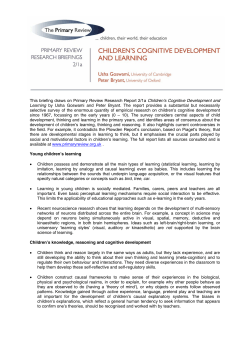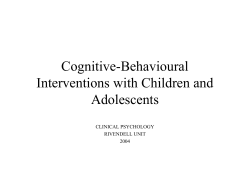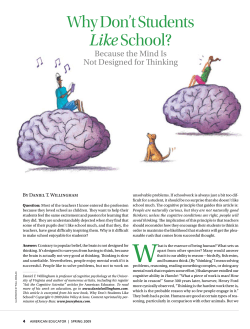
Breast Cancer and “Chemobrain”: The Consequences of Cognitive Difficulties
School of Health Professions University of Missouri Breast Cancer and “Chemobrain”: The Consequences of Cognitive Difficulties Following Chemotherapy and the Potential for Recovery by Stephanie A. Reid-Arndt, PhD, ABPP Because cancer and its treatments can cause cognitive difficulties, emotional distress, and physical symptoms, interventions can improve functioning in each of these areas. Stephanie A. Reid-Arndt, PhD, ABPP, is Assistant Professor at the University of Missouri-Columbia School of Health Professions in the Department of Health Psychology. Contact: ReidArndtS@health.missouri.edu Abstract Up to one-third of women breast cancer survivors report difficulties with concentration, multi-tasking, and memory. Research in the University of Missouri, Department of Health Psychology, suggests that these cognitive difficulties are associated with poorer quality of life among breast cancer survivors after treatment. This article discusses this treatment side effect and its consequences for daily functioning, highlights ongoing research on the potential role of stress in the development of cognitive difficulties, and reviews treatment options. Introduction The Department of Health Psychology (DHP) at University of Missouri is comprised of psychologist practitioners and researchers who are board certified in rehabilitation psychology and clinical neuropsychology. Our department goals include offering the highest quality clinical services, conducting innovative research on behavioral issues with medical populations, and providing clinical and research training to future doctoral-level psychologists. Clinical services (including cognitive assessment and psychotherapy) are provided to individuals who are referred from providers across the state and who have chronic medical conditions (e.g., multiple sclerosis, epilepsy) as well as acquired medical issues that can result in cognitive and physical disabilities (e.g., traumatic brain injury, stroke, spinal cord injury). Complementing these clinical services are the DHP research programs, which similarly strive to address neuropsychosocial issues faced by a range of medical populations. One such line of research, the DHP Cancer Outcomes Research Program, is focused on evaluating and addressing factors that impact quality of life among cancer survivors, with a current emphasis on the relationship between cognitive deficits and functional outcomes among breast cancer survivors. “Chemobrain” Prevalence and Characteristics Breast cancer is the most prevalent malignancy affecting women; with a current survival rate across stages at approximately 88% there are over 2.1 million breast cancer survivors living today. With improvements in mortality rates, medical and behavioral health care providers alike are increasingly attuned 106:2 Missouri Medicine w March/April 2009 w 127 Table 1 to the needs of Average Cognitive Test Scores Over Time cancer survivors following treatment 1.6 completion. 1.4 Research on quality 1.2 of life after treatment 1 for cancer abounds1 0.8 and efforts are 0.6 underway to identify 0.4 factors that lessen 0.2 the quality of life 0 experienced by Time 1 Time 2 -0.2 cancer survivors so -0.4 that treatments to -0.6 address these factors can be developed. ImmMem DelMem Attn ExecFx One issue receiving increased research has found that cognitive attention in survivorship research impairments may diminish over is the impact of treatments of nontime. One series of studies indicated neurological cancers on cognitive that initial cognitive impairments functioning. Labeled “chemobrain” by noted at two years post-treatment7 cancer survivors, cognitive difficulties were no longer present at four have long been reported by patients, years post-treatment9. Another particularly breast cancer survivors, study followed 18 women treated following chemotherapy. Indeed, for breast cancer and found that a growing literature suggests that approximately 45% evidenced chemotherapy is associated with a improved cognitive functioning by one decline in cognitive functioning among year post-chemotherapy10. Finally, a subset of women treated for breast cross-sectional study findings indicate cancer2 with prevalence estimates that cognitive functioning improves ranging from 17-35%3. Deficits have over time after chemotherapy, but specifically been noted in memory4, 5, that individuals with a history of executive functioning6, and attention/ chemotherapy continue to perform concentration7. Several meta-analyses more poorly than healthy controls have revealed small to medium effect even several years after treatment sizes across each of these cognitive completion5. In aggregate, these domains, with the largest effects for data provide evidence that the executive functioning and verbal decline in cognitive functioning memory8. post-chemotherapy may resolve over While a preponderance of time among a portion of affected evidence suggests that cognitive individuals, while some will continue changes can occur after chemotherapy, to demonstrate long term deficits. the duration of these observed changes remains in question. Some studies “Chemobrain” and document long-term deficits, with Quality of Life evidence of cognitive complaints While progress has been among 5-10 year cancer survivors4. made in identifying the type of Importantly however, longitudinal neuropsychological deficits cancer 128 w March/April 2009 w 106:2 Missouri Medicine survivors may experience, studies of the effects that these difficulties may have on quality of life are few. Recent qualitative research has revealed that women cancer survivors perceive they are experiencing difficulties with memory, Time 3 concentration and planning that affect their productivity at home and at work11. VerbFl Additionally, research in the DHP Cancer Outcomes Research Program has revealed that cognitive deficits, present up to one year following treatment completion, negatively affect quality of life among breast cancer survivors12. For this work, women diagnosed with Stage I–III breast cancer were recruited through three cancer treatment facilities in Columbia, Missouri, and they were evaluated at three time points: one month, six months and 12 months postchemotherapy. Of the 46 women who participated in the one month post-chemotherapy appointment, 39 completed the six month followup and 33 remained for the one year follow-up session. During each of these appointments, women underwent standard neuropsychological (cognitive) testing, which included assessment of memory, attention/concentration and executive functioning. Additionally, they were asked to complete questionnaires documenting their cognitive complaints, level of fatigue, psychological functioning, and quality of life. Analyses of group means revealed deficits in executive functioning (e.g., multi-tasking, word finding) at one month and six months following chemotherapy, but not at 12 months post-treatment. See Table 1. However, some individuals continued to experience ongoing neuropsychological difficulties at 12 months posttreatment, which had adverse effects on important functional outcomes. (Reid-Arndt, S.A., Hsieh, C., Perry, M.C. Neuropsychological Functioning and Quality of Life During the First Year after Completing Chemotherapy for Breast Cancer - under review.) Specifically, analyses revealed that at six and 12 months postchemotherapy, breast cancer survivors with poorer executive functioning were reporting lower overall quality of life. Conversely, individuals with better executive functioning were reporting greater satisfaction in their relationship with their doctors. These data provided further evidence that many women experience a resolution of neuropsychological difficulties over time following treatment for breast cancer. However, the findings also highlighted the direct impact that executive dysfunction can have on important aspects of quality of life among a portion of breast cancer survivors. Possible Etiologies of “Chemobrain” Initially it was believed that cognitive changes following cancer treatment were symptoms of depression rather than neurologicallybased cognitive decline. However, a growing body of research has indicated that cognitive deficits occur following treatment in the absence of symptoms of depression7,9. In considering other possible etiologies, it has generally been hypothesized that cognitive deficits result specifically from chemotherapy medications, which may contribute to physiologic changes such as fatigue, hormonal alterations, and direct neurotoxic effects13,14. Additionally, one study has pointed to the possibility that some individuals may be genetically predisposed to experience cognitive deficits following cancer treatment15. There is evidence that neuroanatomical changes may be associated with treatment-related cognitive decline based on structural and functional neuroimaging research13, as alterations in the hippocampus and frontal lobes have been noted among breast cancer survivors with a history of chemotherapy. Interestingly, one study of women prior to and following surgery for breast cancer revealed that cognitive deficits may be present in the absence of chemotherapy16, indicating that factors other than chemotherapy may be affecting cognitive functioning among cancer survivors. Recognizing this possibility, the DHP Cancer Outcomes Research Program is currently evaluating the proposition that physiologic changes associated with the stress response may underlie cognitive impairments associated with cancer treatment. Briefly, the potential role of stress in cognitive decline associated with cancer is suggested by animal and human studies identifying a relationship between neuroendocrine system functioning and memory abilities. Specifically, the hypothalamic-pituitary-adrenal (HPA) axis is the neuroendocrine system responsible for producing glucocorticoid and, ultimately, cortisol; research has documented that chronic stress leads to hyperactivation of this system, resulting in the overproduction of glucocorticoid/cortisol. This has led to the “glucocorticoid cascade hypothesis”, which posits a relationship between chronic high levels of glucocorticoids, atrophy of a neural structure associated with memory (hippocampus), and impaired memory17. Supporting this hypothesis are findings of decreased hippocampal volume and memory deficits among elderly individuals who show increases in cortisol levels over a three to six year period18. Data from other noncancer populations also support the relationship of stress, glucocorticoids and cognitive deficits. For example, cognitive impairment associated with depression may be secondary to HPA axis dysfunction19. Moreover, HPA axis hyperactivation has been linked to cognitive decline in individuals with multiple sclerosis20, who have a high incidence of depression. To begin to clarify potential associations between glucocorticoid production and cognitive impairment in cancer survivors, and to help determine if cognitive deficits may precede chemotherapy secondary to stress, we are currently conducting a study with women who have recently undergone surgery for tumor resection and are subsequently diagnosed with either a benign mass or cancer. Data are collected regarding women’s cognitive functioning, stress levels (via self-report questionnaires and salivary cortisol), coping styles and quality of life during this period after diagnosis and before adjuvant treatment. Comparisons will be made between women with benign masses and women with cancer in order to document group differences in stress levels and cognitive functioning. Additionally, analyses will be conducted to assess the relationships between coping styles, stress levels and cognitive functioning across the two groups. The primary hypothesis is that increased stress levels will be associated with greater cognitive 106:2 Missouri Medicine w March/April 2009 w 129 dysfunction and poorer quality of life. Moreover, we predict that coping styles may moderate this effect, such that individuals using active coping styles will evidence lowered stress levels and less decline in cognitive functioning and quality of life. improved self-reported cognitive functioning, enhanced quality of life, and gains on neuropsychological tests of verbal memory and executive functioning. While one might argue that test score improvements resulted from practice effects, it is noteworthy that the goals of improving survivors’ coping with cognitive problems and quality of life were met. Finally, because cancer and associated treatments can cause cognitive difficulties as well as emotional distress and physical symptoms (e.g., fatigue and balance difficulties), interventions that have the potential to improve functioning in each of these domains may be particularly valuable. Recognizing this, there is a growing interest in alternative interventions that are designed to simultaneously improve both physical and mental functioning, such as yoga and Tai Chi. The DHP Cancer Outcomes Research Program is particularly interested in Tai Chi and the potential health benefits it may offer cancer survivors, and a pilot study of this intervention is currently underway. Briefly, Tai Chi is a Chinese martial art that has long been practiced for health promotion and maintenance. Training in Tai Chi involves practicing forms (slow motion routines) and is based on a number of guiding principles, including mindfulness, breath awareness, active relaxation, and slow movement. See Figure 1. Research with non-cancer populations suggests that Tai Chi may have beneficial effects on physical Figure 1. Preliminary evidence exists that practice of Tai Chi results in changes in the physiological stress response. Treatment Options for “Chemobrain” While there is much to learn regarding the mechanisms that contribute to cognitive decline following cancer treatment, research and clinical experience confirm that cancer survivors are concerned about the potential impact that cognitive difficulties may have on quality of life and daily functioning11, thereby supporting the value of efforts to examine intervention possibilities. Both medical and behavioral interventions have been identified as potential avenues for addressing these difficulties. One medication that has received some empirical support for use in treatment of cognitive difficulties following treatment is methylphenidate. Research with children having a history of cancer has found that use of this medication results in improved cognitive functioning, and particularly attention21. Additionally, a clinical trial of dexmethylphenidate for fatigue in breast cancer survivors has been conducted; preliminary findings reported in 2005 at American Society of Clinical Oncology meeting suggested this medication resulted in improvements in fatigue and in 130 w March/April 2009 w 106:2 Missouri Medicine memory22. However, to date these medications have not been specifically approved for the management of cognitive issues following cancer treatment. In terms of behavioral interventions, general guidelines for cognitive rehabilitation interventions can be considered a starting point. Typically, these interventions focus on metacognitive strategies (i.e., using compensatory strategies), which patients can learn in rehabilitationfocused therapy offered by a rehabilitation psychologist or speech language pathologist. There have been some studies of this strategy with survivors of childhood cancers and positive effects are generally found. Additionally, a rehabilitation-based model for treated cognitive deficits among adult cancer survivors was used in a pilot study23 with positive results. This intervention focused on 1. education regarding cognitive functioning; 2. self-awareness training; 3. self-regulation (e.g., relaxation training, activity scheduling and pacing); and 4. cognitive compensatory strategies training. At six months after the intervention, participants evidenced functioning, emotional well being, and cognitive functioning. In terms of physical functioning, Tai Chi interventions have been shown to positively effect cardiovascular health, respiratory functioning, balance, flexibility and strength24. Positive effects on emotional functioning have been suggested by research revealing that Tai Chi interventions reduce tension, depression, anger, confusion and mood disturbance25. Importantly, preliminary evidence exists that practice of Tai Chi results in changes in the physiological stress response (involving the HPA axis) described above25. As noted above, converging lines of evidence indicate that stress is associated with alterations in HPA axis functioning, which has been linked to cognitive deficits in non-cancer populations. Therefore, our pilot study will assess whether practice in a 10-week Tai Chi class is associated with improvements in cognitive, emotional and physical functioning among women cancer survivors. Measures of cognitive functioning, physical functioning, and self-reported stress levels/emotional functioning are being acquired one to four weeks prior to treatment, which involves a 10-week session of Tai Chi (2 classes/week) and one to four weeks post-treatment. Our first session is currently underway, and a second session is scheduled to begin in late 2008. With this pilot project we hope to determine the feasibility of providing a Tai Chi class to cancer survivors, and to obtain preliminary information regarding the potential benefits to physical, emotional and cognitive functioning for these individuals. Conclusion As these studies demonstrate, the DHP Cancer Outcomes Research Program has three goals with regards to cognitive deficits following cancer treatments: understanding the implications of these difficulties in terms of daily functioning and quality of life, contributing to research considering possible etiologies, and identifying and evaluating treatments to improve the lives of individuals with a history of cancer. While this program of research focuses on a specific medical population, these identified goals mirror those of other research programs in the Department of Health Psychology and contribute to the department’s general mission. Not only do we strive to address patients’ needs in our region with our clinical services, but through our research we also aim to improve the lives of Missourians and all individuals dealing with a variety of chronic medical issues. References 1. Carver CS, Smith RG, Petronis VM, Antoni MH. Quality of life among long-term survivors of breast cancer: different types of antecedents predict different classes of outcomes. Psycho-Oncology 2006; 15(9): 749-758. 2. Tannock IF, Ahles TA, Ganz PA, Van Dam FS. Cognitive impairment associated with chemotherapy for cancer: report of a workshop. Journal of Clinical Oncology 2004; 22(11): 2233-2239. 3. Ahles TA, Saykin A. Cognitive Effects of Standard-Dose Chemotherapy in Patients with Cancer. Cancer Investigation 2001; 19: 812-820. 4. Ahles TA, Saykin A, Furstenberg CT, Cole B, Mott LA, Skalla K, Whedon MB, Bivens S, Mitchell T, Greenberg ER, Silberfarb PM. Neuropsychologic Impact of Standard-Dose Systemic Chemotherapy in Long-Term Survivors of Breast Cancer and Lymphoma. Journal of Clinical Oncology 2002; 20: 485-493. 5. Brezden CB, Phillips K, Abdolell M, Bunston T, Tannock IF. Cognitive Function in Breast Cancer Patients Receiving Adjuvant Chemotherapy. Journal of Clinical Oncology 2000; 18: 2695-2701. 6. Jansen CE, Miaskowski C, Dodd M, Dowling G, Kramer J. A metaanalysis of studies of the effects of cancer chemotherapy on various domains of cognitive function. Cancer 2005; 104(10): 2222-2233. 7. Schagen SB, van Dam FSAM, Muller MJ, Boogerd W, Lindeboom J, Bruning PF. Cognitive Deficits after Postoperative Adjuvant Chemotherapy for Breast Carcinoma. Cancer 1999; 85: 640-650. 8. Anderson-Hanley C, Sherman ML, Riggs R, Agocha VB, Compas BE. Neuropsychological effects of treatments for adults with cancer: a metaanalysis and review of the literature. Journal of the International Neuropsychological Society 2003; 9(7): 967-982. 9. Schagen SB, Muller MJ, Boogerd W, Rosenbrand RM, van Rhijn D, Rodenhuis S, van Dam FSAM. Late effects of adjuvant chemotherapy on cognitive function: a follow up study in breast cancer patients. Annals of Oncology 2002; 13; 1387-1397. 10. Wefel JS, Lenzi R, Theriault RL, Davis RN, Meyers CA. The cognitive sequelae of standarddose adjuvant chemotherapy in women with breast carcinoma. Cancer 2004; 100(11): 2292-2299. 11. Downie FP, Mar Fan HG, Houédé-Tchen N, Yi Q, Tannock IF. Cognitive Function, Fatigue, and Menopausal Symptoms in Breast Cancer Patients Receiving Adjuvant Chemotherapy: Evaluation with Patient Interview after Formal Assessment. PsychoOncology 2006; 15(10): 921-930. 12. Reid-Arndt SA, Hsieh C, Perry MC. Executive Dysfunction is Associated with Poorer Quality of Life One Year after Completing Chemotherapy for Breast Cancer. Accepted for publication in Journal of Psychosocial Oncology. 13. Saykin AJ, Ahles TA, McDonald BC. Mechanisms of chemotherapy-induced cognitive disorders: neuropsychological, pathophysiological, and neuroimaging perspectives. Seminars in Clinical Neuropsychiatry 2003 ; 8(4): 201-216. 14. Reid-Arndt SA. The Potential For Neuropsychology To Inform Functional Outcomes Research With Breast Cancer Survivors. NeuroRehabilitation 2006; 21(1): 51-64. 15. Ahles TA, Saykin AJ, Noll WW, Furstenberg CT, Guerin S, Cole B, Mott LA. The relationship of APOE genotype to neuropsychological performance in long-term cancer survivors treated with standard dose chemotherapy. Psycho-Oncology 2004 ; 12(6): 612-619. 16. Cimprich B, Ronis DL. Attention and Symptom Distress in Women with and Without Breast Cancer. Nursing Research 2001; 50(2): 86-94. 17. Sapolsky RM, Krey LC, McEwen BS. The neuroendocrinology of stress and aging: the glucocorticoid cascade hypothesis. Endocrine Review 1986; 7: 284-301. 18. Lupien SJ, Lecours AR, Schwartz G, et al. Longitudinal study of basal cortisol levels in healthy elderly subjects: evidence for subgroups. Neurobiology of Aging 1995 ; 17: 95-105. 19. Mitchell AJ, Dening TR. Depressionrelated cognitive impairment: possibilities for its pharmacological treatment. Journal of Affective Disorders 1996; 36(3-4): 79-87. 20. Heesen C, Gold SM, Raji A, et al. Cognitive impairment correlates with hypothalamo-pituitaryadrenal axis dysregulation in multiple sclerosis. Psychoneuroendocrinology 2002; 27(4): 505-517. 21. Thompson SJ, Leigh L, Christensen R, Xiong X, Kun LE, Heideman RL, Reddick WE, Gajjar A, Merchant T, Pui C, Hudson MM, Mulhern RK. Immediate Neurocognitive Effects of Methylphenidate on Learning-Impaired Survivors of Childhood Cancer. Journal of Clinical Oncology 2001; 19(6): 1802-1808. 22. Lower ES, Fleishman AC, Zeldis J, Faleck H, Manning D. A phase III, randomized placebocontrolled trial of the safety and efficacy of d-MPH as new treatment of fatigue and “chemobrain” in adult cancer patients. Journal of Clinical Oncology 2005; 23(16S): 8000. 23. Ferguson RJ, Ahles TA, Saykin AJ, McDonald BC, Furstenberg CT, Cole BF, Mott LA. Cognitive-behavioral management of chemotherapy-related cognitive change. Psycho-Oncology 2007; 16(8): 772-777. 24. Wang C, Collet JP, Lau J. The Effect of Tai Chi on Health Outcomes in Patients With Chronic Conditions: A Systematic Review. Archives of Internal Medicine 2004; 164: 493-501. 25. Jin P. Changes in Heart Rate, Noradrenaline, Cortisol and Mood During Tai Chi. Journal of Psychosomatic Research 1989; 33(2): 197–206. Disclosures None reported. 106:2 Missouri Medicine w March/April 2009 w 131 MM
© Copyright 2025









